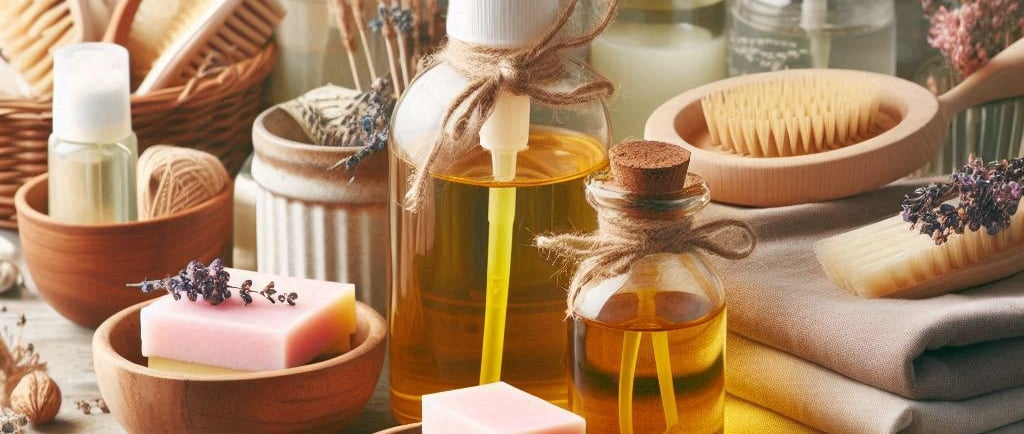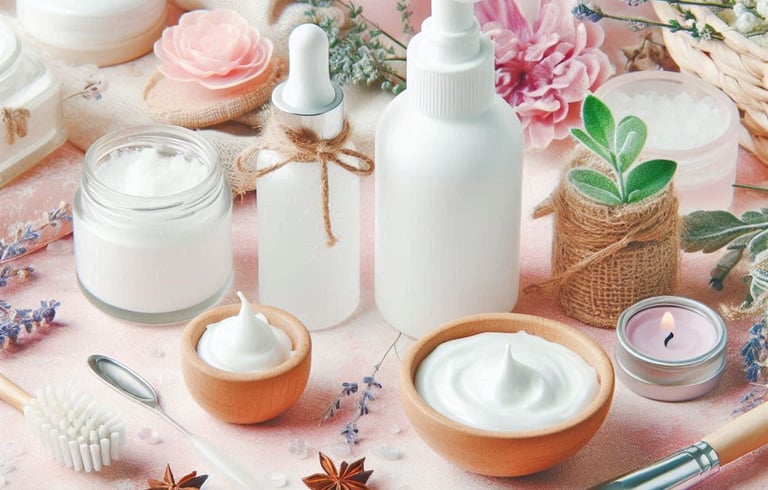Eco-Friendly Homesteading: How to Make Your Own Natural Cleaning and Skincare Products with Simple Recipes
Explore sustainable living with our eco-friendly homesteading guide. Learn practical tips and techniques for reducing your environmental impact while enjoying the homestead lifestyle. Perfect for green-minded individuals!
HOMESTEADING
Kathrine-Anne Hill
8/21/20249 min read


Introduction to Eco-Friendly Homesteading
The growing awareness of environmental issues and the increased desire to lead a more sustainable lifestyle has given rise to eco-friendly homesteading. This approach emphasizes self-sufficiency and environmental conscientiousness, encouraging individuals to take active steps in reducing their ecological footprint. A crucial aspect of eco-friendly homesteading is the minimal use of synthetic chemicals that can impact both personal health and the environment. By adopting sustainable practices, individuals can contribute to a healthier planet while also enhancing their overall well-being.
One significant benefit of eco-friendly homesteading is the reduction of chemical exposure in everyday life. Many conventional cleaning products and skincare items contain harsh chemicals that can be harmful when absorbed through the skin or inhaled. By turning to natural alternatives, it’s possible to create a safer and more health-conscious household. Furthermore, making your own natural products at home can be cost-effective and provide a sense of accomplishment.
This blog post delves deeper into the principles of eco-friendly homesteading by offering practical tips and recipes for natural cleaning and skincare products. Readers will discover simple, accessible methods for creating effective alternatives to store-bought products. These recipes utilize common household ingredients and plant-based materials, ensuring that transitioning to an eco-friendly lifestyle is both straightforward and rewarding. Whether you are a seasoned homesteader or just starting your journey towards sustainability, this guide provides the tools and knowledge needed to make impactful changes in your daily routines.
The Essential Ingredients for Natural Cleaning Products
Creating natural cleaning products not only contributes to a healthier home environment but also aligns with sustainable living goals. Several essential ingredients, commonly found in households, play a crucial role in formulating effective natural cleaners. Understanding the cleaning properties of each element can help you develop versatile and powerful eco-friendly solutions.
Vinegar is one of the most potent natural cleaning agents due to its acidic nature, which helps break down grime and mineral deposits. It is especially effective in cutting through grease and disinfecting surfaces. Distilled white vinegar is preferred for cleaning because of its affordability and wide availability.
Baking soda, or sodium bicarbonate, is another versatile cleaner known for its abrasive quality, which makes it ideal for scrubbing away stains and deodorizing. Its mild alkalinity neutralizes odors while its gentle abrasive action helps in removing tough spots without scratching surfaces.
Lemon juice, with natural citric acid, serves as an excellent degreaser and stain remover. The fresh scent of lemon also acts as a natural deodorizer, leaving spaces smelling clean and fresh. When combined with other ingredients like vinegar or baking soda, it enhances their cleaning properties.
Essential oils not only add pleasant scents to your cleaning products but also bring in various antibacterial, antifungal, and antiviral benefits. Popular options like tea tree oil, lavender oil, and eucalyptus oil add effectiveness to your homemade solutions while creating a delightful aroma.
Castile soap is a versatile, biodegradable soap made from plant oils. Its gentle yet effective cleaning action makes it suitable for numerous uses, from all-purpose cleaners to dishwashing soaps. Available in both liquid and bar form, castile soap is widely celebrated for its ability to cleanse without leaving harmful residues.
Sourcing high-quality, eco-friendly ingredients is vital to ensure the efficacy and safety of your natural cleaning products. Local health food stores, online retailers specializing in sustainable goods, and bulk grocery stores are ideal places to find these items. Choosing organic and sustainably sourced options not only enhances the performance of your homemade cleaners but also supports environmentally-conscious practices.
Simple Recipes for Natural Cleaning Products
Natural cleaning products offer a sustainable alternative to commercial cleaners, which often contain harmful chemicals. Below, we provide detailed recipes for effective and straightforward natural cleaning solutions. These recipes use simple, readily available ingredients and are easy to follow. By integrating these products into your cleaning routine, you contribute to a healthier home environment and reduce your ecological footprint.
All-Purpose Cleaner
Ingredients:
2 cups of distilled water
1/2 cup of white vinegar
20 drops of essential oil (such as lemon or tea tree oil)
1 tablespoon of baking soda
Instructions:
In a spray bottle, combine the water and vinegar.
Add the essential oil and baking soda.
Shake well to mix the ingredients.
Spray onto surfaces and wipe clean with a cloth.
Glass Cleaner
Ingredients:
1 cup of water
1 cup of white vinegar
1 tablespoon of cornstarch
Instructions:
Mix all ingredients in a spray bottle.
Shake well before each use to ensure the cornstarch is evenly distributed.
Spray on glass surfaces and wipe with a lint-free cloth or paper towel for streak-free shine.
Toilet Bowl Cleaner
Ingredients:
1/2 cup of baking soda
1 cup of white vinegar
10 drops of tea tree essential oil
Instructions:
Pour the baking soda and essential oil into the toilet bowl.
Add the vinegar. The mixture will fizz; let it sit for 10 minutes.
Scrub the bowl with a toilet brush and flush.
Laundry Detergent
Ingredients:
1 bar of natural soap (unscented)
1 cup of washing soda
1/2 cup of borax
Instructions:
Grate the soap into fine flakes using a cheese grater.
In a large bowl, mix the soap flakes, washing soda, and borax.
Store the mixture in an airtight container.
Use 1-2 tablespoons per load of laundry, depending on the load size and soil level.
These simple recipes highlight the effectiveness and simplicity of using natural ingredients. By making these eco-friendly products, you foster a healthier living environment and support sustainable living practices.
🛍️ 500Ml/17Oz Home Spray Bottle - Brown Empty Bottle with Spray Clip Pump, Alcohol Spray Can, Disinfectant, Clear Spray, for Hairstyling, Cleaning, Salons, Plants - PET Material🎉 Coupon price[CA$5.90]43.43-86%👉 item link: https://temu.to/m/uedok86tv7q
⭐️Click the link https://temu.to/m/uea3cjokc4a to get 💰CA$100 coupon bundle or ⭐️ Search acd975411 on the Temu App to get 💰30% off discount !!Another surprise for you! Click https://temu.to/m/udnnfc2na2q or Search SEC893794 to earn with me together🤝!
The Essential Ingredients for Natural Skincare Products
Crafting natural skincare products starts with choosing high-quality, beneficial ingredients that promote skin health and nourishment. Among the most popular and versatile components is coconut oil. Rich in fatty acids and antioxidants, coconut oil provides deep hydration and helps to improve skin elasticity. Its anti-inflammatory and antibacterial properties also make it an excellent choice for soothing irritated skin and combating acne.
Next on the list is shea butter, a powerhouse ingredient known for its rich concentration of vitamins and fatty acids. Extracted from the nuts of the African shea tree, shea butter offers unparalleled moisturizing and healing properties. It is particularly useful for dry and aging skin due to its ability to boost collagen production and provide intensive hydration.
Beeswax is another essential element in natural skincare preparations. It acts as a natural emulsifier, helping to blend oils and water-based ingredients. Additionally, beeswax forms a protective barrier on the skin's surface, locking in moisture without clogging pores. This makes it ideal for use in balms, salves, and lotions.
To infuse natural fragrances and targeted skincare benefits, many recipes incorporate essential oils. For instance, lavender oil is renowned for its calming and anti-inflammatory effects, while tea tree oil is praised for its antibacterial and antiseptic properties. Essential oils not only enhance the sensorial experience but also contribute therapeutic benefits to skincare formulations.
Another highly valued ingredient is aloe vera. Known for its soothing and hydrating qualities, aloe vera is commonly used in skincare products aimed at healing and calming the skin. It can be particularly beneficial for sunburn, irritation, and minor wounds due to its potent anti-inflammatory and antimicrobial properties.
Finally, incorporating herbs such as chamomile, calendula, and green tea can further enhance the efficacy of natural skincare products. These herbs are celebrated for their anti-inflammatory, antioxidant, and healing properties. Chamomile soothes sensitive skin, calendula supports wound healing, and green tea provides robust antioxidant protection.
Using these natural ingredients not only reduces exposure to potentially harmful chemicals but also leverages the potent healing properties nature has to offer. Opting for homemade skincare products ensures that you can customize your formulations to best suit your skin's unique needs while maintaining an eco-friendly approach to personal care.
Simple Recipes for Natural Skincare Products
Creating your own natural skincare products at home can be a rewarding and environmentally-friendly endeavor. Below are some simple yet effective recipes for a facial cleanser, body scrub, moisturizer, lip balm, and deodorant. These recipes use natural ingredients, ensuring gentleness and efficacy, often surpassing commercial alternatives. Follow the steps closely for optimal results.
Facial Cleanser
Ingredients:
1 tablespoon honey
2 tablespoons yogurt
1 teaspoon lemon juice
Instructions:
Mix the honey, yogurt, and lemon juice in a small bowl until well combined.
Gently apply the mixture to your face, avoiding the eye area.
Massage the cleanser in circular motions for about one minute.
Rinse thoroughly with lukewarm water.
Body Scrub
Refer to our article "DIY Homemade Body Scrubs with Common Grocery Store Ingredients" for more body scrub recipes.
Ingredients:
1 cup sugar
1/2 cup coconut oil
1 teaspoon vanilla extract or essential oil of choice
Instructions:
Combine the sugar and coconut oil in a mixing bowl.
Add the vanilla extract or essential oil and stir until well blended.
Store the mixture in a jar with a tight-fitting lid.
Use the scrub during your shower, applying it to damp skin and massaging gently before rinsing off.
Moisturizer
Ingredients:
1/4 cup shea butter
1/4 cup coconut oil
1 tablespoon jojoba oil or almond oil
5-10 drops essential oil (optional)
Instructions:
In a double boiler, melt the shea butter and coconut oil together.
Remove from heat and add the jojoba or almond oil.
Allow to cool slightly before adding the essential oil if using.
Whip the mixture with a hand blender until it reaches a creamy consistency.
Store in a clean, airtight container and use as needed.
Lip Balm
Ingredients:
2 tablespoons beeswax pellets
2 tablespoons shea butter
2 tablespoons coconut oil
5-10 drops essential oil (e.g., peppermint, lavender), optional
Instructions:
In a double boiler, melt the beeswax pellets, shea butter, and coconut oil together.
Once fully melted, remove from heat and add the essential oil if desired.
Quickly pour the mixture into lip balm tubes or small containers.
Allow the lip balm to cool and harden before using.
Deodorant
Ingredients:
1/3 cup coconut oil
1/4 cup baking soda
1/4 cup arrowroot powder or cornstarch
10 drops essential oil (e.g., tea tree, lavender), optional
Instructions:
In a mixing bowl, combine the baking soda and arrowroot powder or cornstarch.
Add the coconut oil and blend until you achieve a smooth paste.
Incorporate the essential oil if using.
Transfer the mixture to a small jar or an old deodorant stick mold.
Apply a small amount to your underarms as needed.
By following these straightforward recipes, you can ensure your skincare routine is both effective and eco-friendly. Enjoy the benefits of natural ingredients without the harsh chemicals commonly found in store-bought products.
Tips for Incorporating Eco-Friendly Practices into Daily Life
Transitioning to a more sustainable lifestyle can seem daunting at first, but with a few practical tips, it becomes a manageable and rewarding journey. One essential step is reducing plastic use, which is a significant contributor to environmental pollution. Simple changes like using reusable bags, water bottles, and containers can dramatically cut down on plastic waste. Also, consider purchasing products with minimal or eco-friendly packaging.
Recycling plays a crucial role in eco-friendly living. Familiarize yourself with your local recycling guidelines to ensure you’re sorting and disposing of items correctly. Many communities have recycling programs for different materials, including paper, glass, and certain types of plastic. Additionally, setting up a small home recycling station can keep you organized and mindful of your waste management practices.
Composting is another effective way to reduce waste and support a healthy environment. Composting organic waste such as fruit peels, vegetable scraps, and coffee grounds turns them into nutrient-rich soil for gardening. Whether you live in an apartment or a house, various composting methods such as vermicomposting, bokashi, or simple backyard composting can fit your space and lifestyle.
Growing your own herbs and vegetables is an excellent way to ensure a fresh, organic supply of produce while reducing your carbon footprint. Even if you have limited space, container gardening on a balcony or windowsill can yield a bounty of herbs like basil, parsley, and mint. For those with more outdoor space, creating a small vegetable garden can be a fulfilling endeavor, providing you with produce that hasn't traveled long distances or been packaged in plastic.
Adopting these eco-friendly habits gradually is key to making the transition smoother and more enjoyable. Start with one or two small changes and build upon them over time. Whether it's reducing plastic use, committing to recycling, composting, or growing your herbs and vegetables, each step contributes to a more sustainable lifestyle. By integrating these practices into your daily routines, you can make a significant impact on the environment and cultivate a more eco-conscious way of living.




Affiliate Disclaimer:
Please note that some of the links in this article are affiliate links. This means that if you click on these links and make a purchase, I may receive a small commission at no additional cost to you. This commission helps support the maintenance and growth of this website and allows me to continue providing valuable information and recommendations. Rest assured, I only recommend products and services that I have personally used or thoroughly researched. Your support is greatly appreciated!





